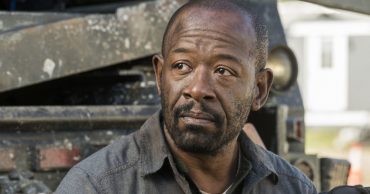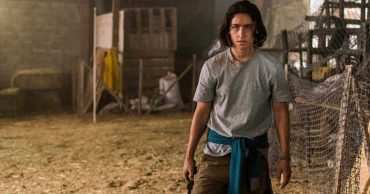
For Fear the Walking Dead reviews at TVOvermind, we will be doing something different than usual and having two of our writers, Randy Dankievitch and Dara Driscoll, give their opinions on the series. Both of them will review the premiere and finale, while alternating between the other four episodes. Here’s Randy’s take on last night’s premiere:
Fear the Walking Dead is both an intriguing and frustrating proposition: setting a story during the first days of the iconic apocalyptic events preceding The Walking Dead offers a different, and equally important, perspective on the downfall of humanity. At the same time, returning to the well of zombies – even in a new setting with new characters – is another example of television’s increased predilection for reboots, remakes, and “re-imaginings,” denying audiences the opportunity to invest and explore new stories and ideas. This dichotomy is readily apparent in “Pilot,” an hour of television that tries to establish itself as a unique entity while still retaining the very same characteristics and priorities of its wildly popular older sibling: it’s as suspenseful as it is mindless, and as unique as it is terribly familiar, a show that struggles to convey the subtleties of human emotion, but knows how to ratchet up the tension t any given moment.
“Pilot” is less about the slow infestation of zombies into Los Angeles (and the world), than it is a story about a drug-addled son and the family he’s threatening to tear apart. Immediately, Fear the Walking Dead establishes a much more complex family structure than The Walking Dead: Madison Clark (Kim Dickens) lives with her fiance (and coworker) Travis, and her daughter Alicia, trying to help her heroin-addicted son Nick get his life together. Travis has an ex-wife Liza, and a son Chris, who resents his father for his parent’s divorce. Much of “Pilot” is tied up in their family dynamics, and the many estrangements Madison and Travis are dealing with: only Alicia seems to have her life together, planning to go to college and dating an art lover (Maestro Howell, best known as Randy Wagstaff from The Wire).
Madison is the show’s de facto protagonist (though I think the show’s creators would say the Manawa/Clark family is the collective ‘star’ of the show), but Nick is our entry into the way, the unreliable narrator to the rest of the world that end days are upon us. “Pilot” begins with him seeing his dead girlfriend eating someone’s face in a church taken over by addicts; it ends with him murdering his heroin dealer in front of his parents, running him over with the family’s pick up while going through the typical symptoms of a withdrawn addict thinking they’re losing their mind.
Despite that massive arc happening in the course of 63 minutes, “Pilot” is really a slow burn that tries to build a complicated web of emotions around the children of the family – while some of it works for Nick, putting that onus on him and the rest of the teenagers in the cast to carry the emotional load. And that’s where “Pilot” really comes up short: be it depicting Nick’s drug dealer as some clean cut, loving but murderous idiot who would try to murder him in broad daylight, or the pimply kid Madison doesn’t expel for bringing a knife to school (he acts as seer, telling her life as we know is going to end), Fear the Walking Dead suffers the familiar problem of trying to make the saccharine emotions of teenagers and idiots (like Nick) matter: and when a show can only ask us to invest in its most immature, ridiculously thin characters, it has only its zombie moments to fall back on.
Madison and Travis just aren’t strong enough presences in this episode: they’re both there, but their focus is squarely on their children at all times, refusing to accept obvious truth in the name of keeping the dream alive. For Madison, it’s getting her seemingly delusional son clean; for Travis, it’s getting his estranged son to accept him in his life again and forgive him for the divorce Travis and Liza put him through. Beyond that, these two adults aren’t really represented as anything else; and that lack of pathos for their characters beyond protectors of their children denies Fear the Walking Dead an important component of its story telling, and the shocking adjustment parents have to make as their teenagers begin to transform into adults – and everyone else around them begins turning into flesh-eating, mindless animals.
Most of all, though, “Pilot” suffers because it feels like an hour-long D.A.R.E. special about the dangers of doing drugs – and not in a fun way, like iZombie does with its premise, integrating it into its mythology. With the zombie outbreak explicitly never being tied to anything (Robert Kirkman has reiterated this a million times), “Pilot” instead feels like everyone in Nick’s path denying everything he’s saying (even when incontrovertible evidence shows up on an internet viral video, because of course that’s how we’d all find out) just because he’s a drug addict, and therefore a psychopath who has no semblance of reality. Because of that saccharine mentality, “Pilot” is only engaging when its leaning on the audience’s knowledge of the future: and when we know what is coming, it’s essential that Fear the Walking Dead – which is being billed as a family drama first, and zombie show second – can fill that space with something other than stories that only allow characters (and by proxy, the world around them) to exist in two dimensions.
Other thoughts/observations:
– I quite enjoyed Nick’s zombie-esque stagger around at the beginning of the episode. Best allusion in an episode full of them.
– Why does every single graffiti-laden drug house in cinematic history have an ominous quote in them?
– Madison is disappointed she’s only “batting .500” with her children. She doesn’t know much about statistics, we can presume.
– “Pilot” also wants us to care where Matt is, when only his girlfriend Alicia seems to give a crap.
– The principal’s reaction to the near-empty buses arriving at school is great: “What, did you skip a few stops?”
[Photo via AMC]
 Follow Us
Follow Us





